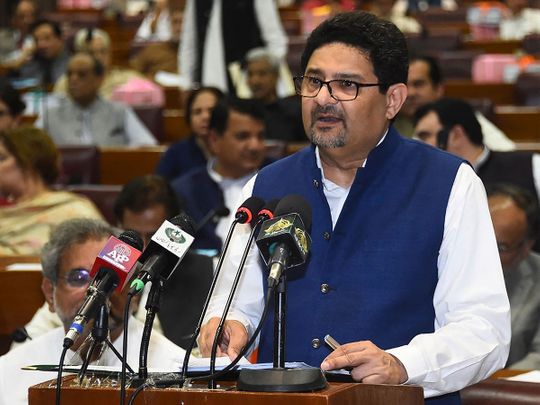
Dubai: Amid an inherited severe financial crisis, the two-month-old coalition federal government on Friday announced a progressive and relief-oriented budget for the fiscal year 2022-23, with a total outlay of PKR9.5 trillion to stabilize the ailing economy and lessen the sufferings of downtrodden segments of the society.
The budget specially focused on fiscal consolidation to curtail overall deficit, prioritizing practical austerity measures along with strategies to enhance tax-to-GDP (gross domestic product) ratio, reduce gross public debt, slice trade, and current account deficits, and promote sustainable economic growth.
Announcing the radical national development and pro-common man initiatives in the National Assembly, Minister for Finance and Revenue Miftah Ismail said the budget was being presented at a critical juncture as the previous government had caused huge damage to the economy during its three years and nine months tenure.
Key priorities
He said the government had embarked on introducing drastic measures in the Federal Budget 2022-23 to uplift and put the economy on a sustainable growth trajectory.
The finance minister said out of the total PKR9.5 trillion budget, an amount of PKR2,950 billion had been allocated for debt servicing and PKR800 billion earmarked for the Public Sector Development Programme (PSDP 2022-23).
He said PKR1,523 billion had been earmarked for defence expenditures, PKR550 billion for civil administration, and PKR530 billion for pensions. Similarly, PKR699 billion had been proposed for providing targeted subsidies to the poor segments of society.
Relief allowance
Miftah announced 15 per cent ad-hoc relief allowance in the basic salaries of the federal government employees, besides merging previous ad-hoc relief allowances in the basic pay.
He said as the poor segments could not bear the burden of rising inflation, Prime Minister Shehbaz Sharif intended to give maximum relief to them through targeted subsidies, so the government decided to impose special tax on higher-income earnings.
GDP growth
He said one of the biggest challenges faced by the country was to achieve at least 5 per cent GDP growth rate sans current account deficit, taking the GDP from PKR6,700 billion to over PKR7,800 billion.
The minister said the inflation stood at 11.7 per cent which was the highest during the last 10 years and vowed to bring it down with improved fiscal and monetary policies.
He said the tax ratio in the countries of emerging economies was 16 per cent of their GDP and it was 8.6 per cent in Pakistan, which would be taken to 9.2 per cent in the next fiscal year. “In 2017-18, our (Pakistan Muslim League-Nawaz) government had left the tax-to-GDP ratio at 11.1 per cent.”
• The minimal taxable income limit will be raised from PKR0.6 million to PKR 1.2 million for the salaried class.
• Salaries of government increased by 15%.
• Taxes on Behbood Saving Certificate and Pensioners Benefit Account to be dropped to 5%.
• PKR 24 billion has been allocated to the health sector.
• PKR 65 billion proposed for HEC.
• Advance tax to be increased on cars above 1600cc.
• Exemption of complete custom duty on more than 30 pharmaceutical ingredients.
• The banking sector will now face a taxation rate of 42%, up from the current 39%.
• PKR 1,523 billion allocated for defence expenditure.
• Withholding tax abolished on film distributors.
• A family with a household income of less than PKR 40,000 will be given a transfer of PKR 2,000.
• Families using less than 200 units of electricity will be given loans in easy instalments for purchasing a solar panel.








